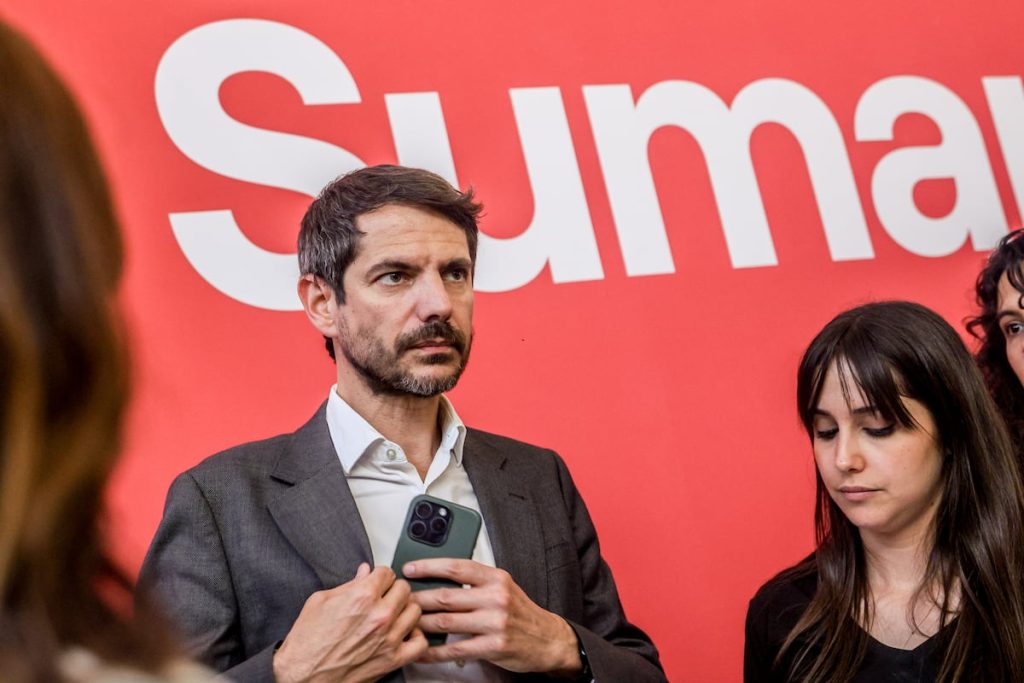Suma begins a new phase this Thursday. Just four days after the European elections, and in their first meeting since Yolanda Díaz announced that she was stepping aside and leaving the position of general coordinator, the party’s leadership has temporarily handed over control of the organization to four members who are already part of the core of the Executive. They will be the current head of Organization, Lara Hernández; the head of Communication, Elizabeth Duval; the secretary general of the parliamentary group, Txema Guijarro; and the Secretary of State for Social Rights, Rosa Martínez. The decision to have an “interim collegiate coordinator” in the coming months, presumably until a new assembly in autumn, has been proposed during the meeting of the 80 members of the coordinating group, the party’s highest decision-making body, held behind closed doors with Díaz present. Upon arrival at the meeting, spokesperson Ernest Urtasun stated that the objective is to “strengthen the organization” and “guarantee the stability” of the leadership bodies during the “reflection” process, while focusing on advancing the legislative agenda from the Government.
The chosen individuals were already in positions of maximum responsibility in the party and in the Executive. Lara Hernández, who practically served as the number two with Urtasun, was appointed head of Organization in April. The former leader of Izquierda Unida with Cayo Lara was a candidate for IU in the European elections, federal head of convergence, and responsible for negotiating the processes of convergence with Podemos. Elizabeth Duval joined the project during the general election campaign, and in recent months her role within the organization has become more prominent. Both the addition of Rosa Martínez and Txema Guijarro allow for direct links to the Government and the congressional group. Martínez was already in charge of Ecosocial Transformation for Suma, while Guijarro was in charge of Institutional Coordination. With this step, the party faces an uncertain stage. Díaz resigns as the organization’s top leader but remains in the Executive and continues as an institutional and political reference of the leftist coalition, in which she still serves as vice president, spokesperson with Pedro Sánchez, and president of the parliamentary group.
This move, in which the Minister of Labor personally assumes responsibility for the poor results of last Sunday (three MEPs and 4.65% of the vote), allows her to focus on government action — crucial for Suma as their ability to fulfill the program largely determines their future usefulness — while also distancing herself from internal conflicts and disputes with other parties. After the debacle in the Galician elections and the poor results in the Basque and European elections, criticism from parties like Más Madrid and Izquierda Unida regarding Suma’s drift has intensified. The other actors now want to usher in a stage of greater horizontal cooperation between organizations, in which Díaz’s party is just one among many. All parties have agreed to convene a coalition table for political forces to renegotiate the terms of the agreement among them. Until now, discussions have been bilateral only.
The draft presented to the Executive defends Yolanda Díaz’s political capital and stipulates that the parliamentary group must be more assertive. In addition to the collegiate coordinator, it is established that Díaz will coordinate government action with the PSOE within the coalition government and a working group of the forces within Suma will be created to develop a proposal for negotiating the 2025 Budget. Suma faces several challenges: reconnecting with a disappointed electorate that has turned away by nearly 70% since the July 2023 general elections; working on their territorial presence, a complex task when the organization currently lacks clear leadership and Sumar is one of the smallest parties in the space, supported by other parties with strong roots in certain communities. The future relationship with Podemos also remains unresolved, a topic that neither party wants to discuss at the moment because the wounds are still fresh, with Irene Montero’s candidacy just securing two seats in Brussels (only one less than Suma) and no elections in sight.
Many uncertainties lie ahead. The vice president has not confirmed or denied her interest in running as a candidate again — in an interview on TVE this Thursday, she simply stated that she has not expressed a desire to do so — and the project without her figure remains somewhat incomplete. Subscribe to continue reading.


